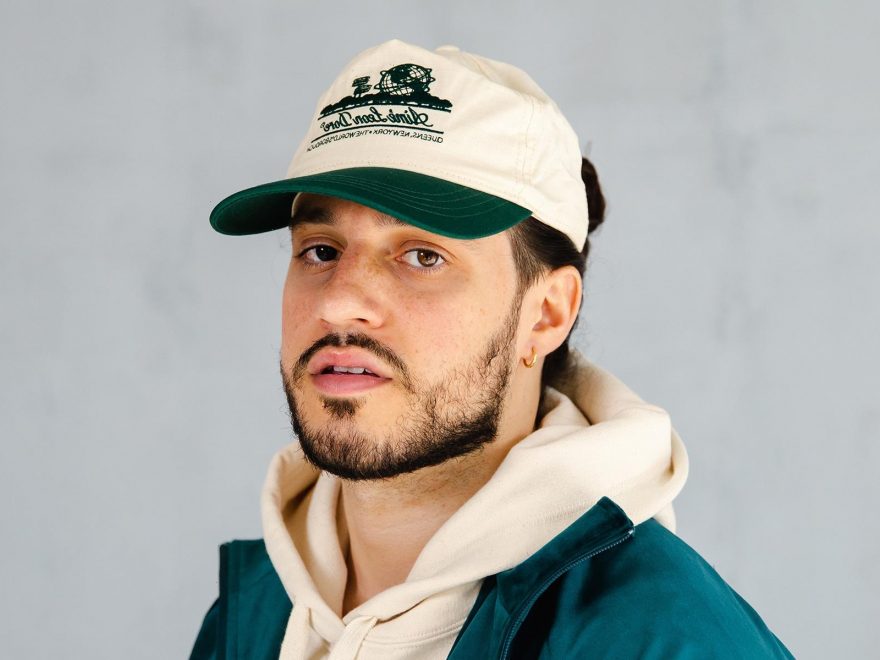Russ’ “Handsomer” is minimal and teeth-rattling, little more than a stream of boasts delivered over a clap-thunk beat. Released last month, the single quickly started to peak interest on TikTok, spurring the rapper to launch an open verse challenge — an opportunity for aspiring artists to add their own eight bars to the track and impress its creator. Ktlyn, a young MC from San Diego, succeeded with her own cheerfully mercenary version — “I gets money baby / I just rather spend yours first” — which took off in parallel to the original; both have now spawned close to 100,000 videos.
It’s not surprising, then, that the single is earning more than 2 million streams a day on Spotify alone, scoring Russ another hit. But he’s more excited to give a leg up to a previously unknown artist than to be back on the charts. “She killed it, so why wouldn’t I put this version out as the remix?” he asks. “If I went and did the industry thing and got some big established act to do the remix, it would look forced. And my fans would’ve been all in the comments like, ‘we wanted Ktlyn!’ Now I’m facilitating big milestones for her. She had never heard herself on the radio before. Being able to help her win is incredible.”
The timing couldn’t be better for Russ, who announced the launch of his own independent label, Diemon (pronounced like “diamond”), on Wednesday. He hopes to help more artists like Ktlyn win. “What’s going on with ‘Handsomer’ right now is proof of concept,” Russ tells Rolling Stone. “This [song] was up against millions and millions of dollars of major label campaigns and rollouts, and it was still Number One across all genres on iTunes. If ‘Handsomer’ gets deleted off the internet tomorrow, it already shows everyone you don’t need a major” to have a hit.
This has been one of the foundational tenets of Russ’ career. Even before “Handsomer” shot into the Hot 100, the rapper’s catalog was amassing close to 4 million streams a day on Spotify alone as an indie act, numbers that put him on par with major label artists like Childish Gambino, A$AP Rocky, and blackbear. Russ is adamant that “there’s nothing you can do as a major label artist that you can’t do independently.” Launching Diemon is an effort to put his money where his mouth is — to see if he can help other artists achieve a comparable level of commercial success on an independent path.
It’s one of the paradoxes of the modern music industry: While it has never been easier or cheaper to reach millions of listeners on your own, the vast majority of artists still hand a large percentage of their earnings to a major label to help them achieve that goal. Bugus Thompson, Russ’ longtime collaborator and a partner in Diemon, thinks that’s because “you grow up and you’re programmed to think artistic success happens a certain way. You don’t see too many examples of super successful indie people — for every Russ, there are 30 guys that are signed and flashing their lifestyles on social media every day, so you think that’s the path.”
He’s hoping that Diemon can combat that narrative. After all, “to get a major label deal, indie success is almost a prerequisite,” Thompson continues. Major labels “aren’t signing someone with zero followers and building them up. They’re finding people who are already successful on their own.”
Not that Russ and company don’t understand the urge to put their name on a major-label contract. “There was a time when we wanted to grow up and sign to a label super early on before we knew anything,” Russ acknowledges. And he even went so far as to partner with Columbia Records in the summer of 2016 — though he was careful to craft a short-term deal where he maintained ownership of his masters and split profits with the label — because he was worried he’d maximized his reach. “I was looking around like, ‘I don’t see any indie artists on the radio,’” Russ explains. “I partnered primarily to get the radio support.”

Russ and Bugus
Russ says his time working with a major “wasn’t a shitty experience at all.” But looking back now, he attributes his need to partner up to his own lack of education. Artists often look to major labels to help them get on prominent playlists, get airplay, and get big looks at magazines and television, Russ says. But he realized that none of those things are guaranteed, even with major label backing. “People at the [streaming services] tell people at the labels ‘no,’ every day all day,” the rapper notes. “Same with radio. I can get told ‘no’ myself. And I don’t need to give y’all a big percentage of the profits to get told ‘no.’”
So he returned to the indie life, bulking up with his own radio promoters and PR agency. Artists that sign to Diemon will be able to use those teams as well. Thompson also believes that a core part of the label’s appeal will be that its leaders are in the trenches along with their acts. “We’re not suits with no rhythm,” he says. “We’re also artists that are active [and] currently in the game.”
Diemon’s first signing is LaRussell, a “fire” rapper from Vallejo, California that Russ found on TikTok. LaRussell will maintain ownership of his masters and creative control of his music. “You’re just supposed to provide resources, not tell people what to make, what to wear,” Russ says. “Help with PR, give them money, get out of the way — it’s not any more complicated than that.”
Source: Read Full Article
